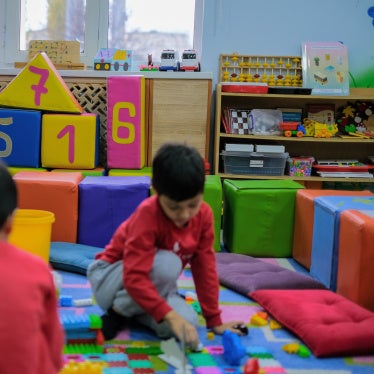(New York) - Governments should act quickly to ensure universal ratification of key international treaties protecting children from use in war and from sexual exploitation, Human Rights Watch said today. May 25, 2010, is the 10th anniversary of the adoption by the United Nations General Assembly of two treaties prohibiting the use of child soldiers, the sale of children and child prostitution and pornography.
The treaties - both optional protocols to the Convention on the Rights of the Child - have won wide support, but 44 countries have yet to ratify either protocol. The optional protocol on the involvement of children in armed conflict has been ratified by 132 countries, and the optional protocol on the sale of children, child pornography, and child prostitution has been ratified by 137 states.
"The children's rights treaties have helped to reduce the number of child soldiers and protect children from sexual exploitation," said Jo Becker, children's rights advocacy director at Human Rights Watch. "Countries that have not ratified them should do so quickly so that no child will be without these basic protections."
A group of 12 international human rights, humanitarian, and child rights organizations, including Human Rights Watch, Amnesty International, Save the Children International, and World Vision sent joint letters today to the UN ambassadors of countries that have not yet ratified one or both protocols, urging them to do so as soon as possible in order to strengthen an "unequivocal norm" against the use of child soldiers, and the sale and sexual exploitation of children.
In 2000, children were being used or had been used recently as soldiers in an estimated 36 armed conflicts, according to the Coalition to Stop the Use of Child Soldiers. A new report issued Friday by the UN secretary-general, found that child soldiers are actively participating in armed conflict in only 16 countries. While the decline is in part due to a smaller number of conflicts, it also reflects a change in laws and practices. Some countries have demobilized children from their armed forces, adopted national legislation to raise the minimum age for voluntary recruitment, or changed policies to prohibit the deployment of children into hostilities.
Some countries also have taken legal and other measures to prevent the sale of children, child prostitution and child pornography. They have criminalized such acts, taken tougher measures to punish offenders, established specialized law enforcement units to deal with sexual exploitation of children, and ensured that child victims are rehabilitated and reintegrated in society.
"It's remarkable that nearly two-thirds of the world's countries have ratified the children's rights protocols in just a decade," Becker said. "However, the remaining countries should act to make clear their commitment to abolish these terrible forms of child exploitation."







